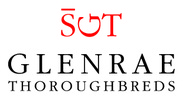Thoroughbreds are smart and are naturally driven to please their riders, making them fairly easy to train. Every horse has the potential to become a great athlete, and as with any sport, it all comes down to training. Sending your horse to a prepping centre is essentially like taking your child to school for the first time. You want the transition to be calm and to ease them in slowly instead of pushing them into the deep end, frightening them half to death.
It’s important to make sure that your horse gets used to each stage of training before moving onto the next one so that they can feel confident in their newfound discipline.
Why Is Pre Training Important?
Thoroughbred yearlings can be a handful. Getting a handle on them and giving them something to keep their brains and bodies active will pay off in the long run. A thoroughbred’s early life is important for building bone density to help them carry the heavy workloads, especially on the legs. This makes understanding the fundamentals of biomechanics and muscle development very important. Just as important as physical training is the education process in which a horse learns to listen to cues and develops good manners.
What To Expect From A Prepping Centre
Through the different stages of thoroughbred pre training, you can expect the following.
1: Round pen (lunge pit). Learn to listen to voice commands, be relaxed and accept pressure from both sides of the bit, as well as getting comfortable being long-reigned. Pairing up horses may reduce stress if one horse is reluctant to move forward in the lunge pit.
2: Spending time in the paddock, being on the walker tacked up and being ridden. They will eventually progress to a larger trotting ring and learn to be relaxed in their mouth and stretch out their backs.
3: Cantering and accepting walking through stalls with a rider on their back. Enhancing the horse’s stamina, fitness and flexibility will ensure the quality at which your horse will perform. It is important to ensure that the horse is comfortable and accepting of every new discipline and to listen to their cues just as much as they listen to yours.
While the overall process is relatively standard, every horse is different and learns at its own pace. Therefore, the routine will be adjusted to accommodate the horse’s behaviour and education level. This is where the skill and experience of the educators come into play, where their knowledge and expertise can make a difference to the horse's career and the safety of future riders.
For excellent thoroughbred pre-training, contact us today to start your horse on the path to success.
Why Is Pre Training Important?
Thoroughbred yearlings can be a handful. Getting a handle on them and giving them something to keep their brains and bodies active will pay off in the long run. A thoroughbred’s early life is important for building bone density to help them carry the heavy workloads, especially on the legs. This makes understanding the fundamentals of biomechanics and muscle development very important. Just as important as physical training is the education process in which a horse learns to listen to cues and develops good manners.
What To Expect From A Prepping Centre
Through the different stages of thoroughbred pre training, you can expect the following.
1: Round pen (lunge pit). Learn to listen to voice commands, be relaxed and accept pressure from both sides of the bit, as well as getting comfortable being long-reigned. Pairing up horses may reduce stress if one horse is reluctant to move forward in the lunge pit.
2: Spending time in the paddock, being on the walker tacked up and being ridden. They will eventually progress to a larger trotting ring and learn to be relaxed in their mouth and stretch out their backs.
3: Cantering and accepting walking through stalls with a rider on their back. Enhancing the horse’s stamina, fitness and flexibility will ensure the quality at which your horse will perform. It is important to ensure that the horse is comfortable and accepting of every new discipline and to listen to their cues just as much as they listen to yours.
While the overall process is relatively standard, every horse is different and learns at its own pace. Therefore, the routine will be adjusted to accommodate the horse’s behaviour and education level. This is where the skill and experience of the educators come into play, where their knowledge and expertise can make a difference to the horse's career and the safety of future riders.
For excellent thoroughbred pre-training, contact us today to start your horse on the path to success.

 RSS Feed
RSS Feed